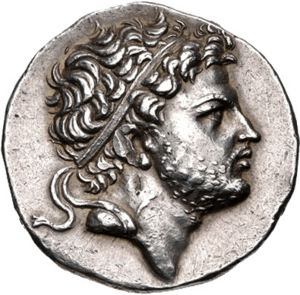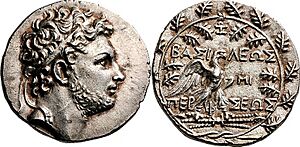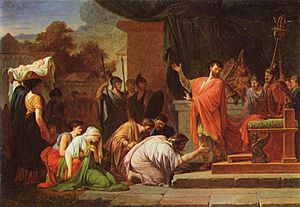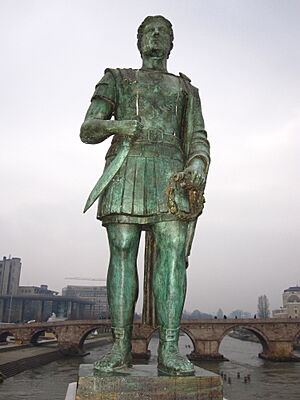Perseus of Macedon facts for kids
Quick facts for kids Perseus |
|
|---|---|
| Basileus | |

Portrait of Perseus on the obverse of a tetradrachm
|
|
| King of Macedon | |
| Reign | 179–168 BC |
| Predecessor | Philip V of Macedon |
| Successor | Monarchy abolished (Andriscus claimed in 149 BC) |
| Born | 212 BC Pella, Macedonia |
| Died | 166 BC (aged 46) Alba Fucens, Italy, Roman Republic |
| Spouse | Laodice V |
| Issue | Alexander (son of Perseus) |
| Greek | Περσεύς (Perseus) |
| House | Antigonid dynasty |
| Father | Philip V of Macedon |
| Mother | Polycratia of Argos |
| Religion | Greek polytheism |
Perseus (Greek: Περσεύς, romanized: Perséus; around 212 – 166 BC) was a powerful king of Macedon. This was an ancient Greek kingdom. He ruled from 179 BC until 168 BC. Many people see him as the very last king of Macedonia. He was also the last ruler from the Antigonid family. His defeat by Rome in the Third Macedonian War changed everything. It meant Macedonia was no longer an independent country.
Early Life and Family
Perseus was the son of King Philip V of Macedon. His mother was likely Polycratia of Argos. His father, Philip V, spent most of his time trying to keep Macedonia strong. He wanted to control Greece, but many Greek cities resisted. Later, he also faced the growing power of the Roman Republic.
Philip V lost a major war, the Second Macedonian War. After this, he had to accept Rome's power in Greece. Perseus himself led Macedonian troops in some of these wars.
Perseus had a younger half-brother named Demetrius. Demetrius was sent to Rome as a hostage after a war. He became friendly with the Romans. Perseus worried that Demetrius might become king instead of him. In 180 BC, Perseus made it seem like Demetrius was plotting against their father. This convinced Philip V to have Demetrius executed. Philip V died the next year. Perseus then became king on June 22, 168 BC.
Perseus's Reign as King

In 172 BC, Eumenes II, the king of Pergamon, was worried. He saw Macedonia's power growing in the eastern Mediterranean Sea. He spoke to the Roman Senate, saying Perseus was a threat. Soon after, Rome and Perseus went to war. This was the Third Macedonian War (171-168 BC).
Perseus had some early successes in the war. However, the war ended with a big defeat for him. This happened at the Battle of Pydna. He surrendered to the Roman general Lucius Aemilius Paullus. Perseus was then taken to Rome as a prisoner. His half-brother Philippus and son Alexander were also captured.
After Perseus's defeat, the Antigonid kingdom was broken up. It was replaced by four separate republics. Perseus was paraded as a captive in Paullus's victory celebration. He was then kept in good conditions at Alba Fucens for the rest of his life. He died in 166 BC.
In 178 BC, Perseus married Laodice V. She was the daughter of Seleucus IV Philopator from Syria. Their son, Alexander, was still a child when Perseus lost the war. After the Roman victory parade in 167 BC, Alexander was also kept at Alba Fucens with his father. He grew up to be a skilled metalworker. He also learned the Latin language and became a public notary.
Legacy of Perseus
In 149 BC, a man named Andriscus claimed to be Perseus's son. He announced he would take Macedonia back from the Romans. He managed to break Roman rule for about a year. But in 148 BC, the Romans defeated him. This truly marked the end of Macedonian kings. In 146 BC, the four republics were dissolved. Macedonia officially became a Roman province.
See also
 | John T. Biggers |
 | Thomas Blackshear |
 | Mark Bradford |
 | Beverly Buchanan |



